"If a memory can be canned, I hope it never expires." |
Cop 223 |
I'll save some time and kick ambiguity out of the window here by stating up front that Chunking Express, the third feature from Hong Kong maestro Wong Kar-wai, stormed onto my favourite films just seconds after I first saw it, and that subsequent viewings have only served to consolidate its position as one of the smartest, most skin-pricklingly cool and enjoyable movies ever made. Why? Hell, you want reasons? Well here are six to chew on.
1. The Opening Sequence
Some time ago, in the early days of this site, I posted a collaborative article on great movie opening sequences. It was always intended as a light-hearted piece, designed in part to get a couple of those who had promised to contribute to the site to actually do so. But the choices – MY choices – were genuine. These were opening scenes that made such an impression that the filmmaker could have taken me anywhere afterwards and I'd have followed like a devoted spaniel. Of course, it's always something of a relief when they actually take you somewhere worth visiting, which is why the current Hollywood habit of opening with a bang and then going nowhere feels like such a con. The list was never meant to be exhaustive, just a few personal favourites thrown in for consideration, but every time I look back at it I'm struck by how just how many titles that should have been there that I somehow missed. And top of the list just has to be Chungking Express.
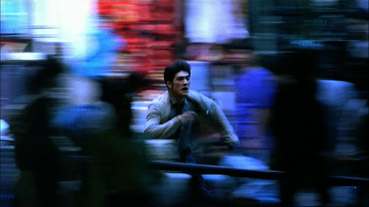
Now I've been known to go on the odd rant about the issue of style over content in Hollywood movies, which puts me in a somewhat awkward position when I get all excited by the style of a film before I'm even aware that there is content to back it up. But oh, what style... The opening of Chungking Express doesn't so much grab you as forcibly suck you in like you're caught in the pull of a passing jet engine. Set to an instantly memorable, stuttered-rhythm theme that feels simultaneously urgent, laid-back and mysterious, a woman dressed in a raincoat, a blonde wig and large sunglasses moves purposefully through the busy market back-alleys of Hong Kong in energetic hand-held stepped motion.* Over silhouetted shots of rooftops at twilight, a male voice muses on the nature and consequence of chance encounters, then introduces himself as He Qiwu, a cop with the badge number 223. Seconds later he is moving through the same busy back streets, being observed in similarly kinetic manner as he chases a fleeing handcuffed and head-bagged figure. A clock ticks over to 9pm, and the film slows to a halt just as 223 and the sunglass-wearing, blonde-wigged woman almost collide. Qiwu's voice-over tells us this: "At the closest point of our intimacy, we were just 0.01 centimetres from each other. Fifty-seven hours later I fell in love with this woman." Now if this doesn't hook you then my description has fallen way short, though however I tell it, I'm never going to do justice to how sublimely it plays. Their moment of near contact is exquisite, and forty minutes later it is gloriously repeated with a couple of crucial alterations, as the two main characters hand over to a second pair and an altogether different relationship story unfolds.
2. The Story
I'm assuming that a good many of you know the film and can skip to the technical specs, but if you're new to it or have just never got around to seeing it then some expansion on the plot will hopefully persuade you to do so. I'm taking it as read here that you have a preference for the offbeat over the formulaic or you probably wouldn't have got this far into a review of this film on this site.
Chungking Express is a portrait of two street cops at the tail end of relationships and two women they become involved with though chance encounters. Cop 223 is still hanging on to the possibility that his departed girlfriend May will return, but after a month of fruitless waiting he hits a bar to celebrate his birthday and drown his sorrows, pledging to fall in love with the next woman who walks through the door. At the same time, the woman he came so close to bumping into during the opening sequence is operating on the other side of the law, brusquely preparing a group of men from the city's Indian quarter to act as drug couriers, a plan that goes awry and sends her fleeing for her life. By the end of the day all she wants is a drink and a quiet spot to rest. Want to guess which bar she picks?
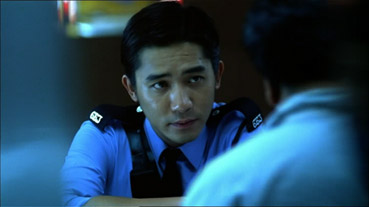
In the second story, Cop 663, aka He Zhiwu, is also quietly mourning the departure of a girlfriend, a flight attendant who has been lodging at his flat since the two first got together. Like 223, he regularly frequents the Midnight Express fast food bar and is on similarly friendly terms with its manager. Newly employed there is the manager's young cousin Faye, whose instant fascination with 663 goes unnoticed by the preoccupied policeman. When the air hostess drops a letter off at the bar for her ex-boyfriend to pick up, Faye steams it open and uses the enclosed key to sneak into 663's apartment, where initial curiosity quickly develops into a compulsive relationship with the abode and its contents.
And if that's not intriguing enough for you, then know that thematically there's also plenty more going on beneath surface, as the film quietly explores the consequences of chance encounters, the nature of secret infatuation, the transitional nature of relationships, the importance of calm pockets in the chaos of modern living, our sometimes eccentric attachment to places and objects, how love and longing can prove barriers to reality... you'll have little trouble coming up with an even longer list of your own.
3. The Character Detail
Using the above set-up as its operations base, the film soars in the often quirky detail that infuses and enlivens every scene and defines each character as distinctly as their appearance, and in the case of the identically attired policemen considerably more so. Nowhere is this more evident than in the nature of 223's pining for the unseen and departed May, which involves him buying a can of tinned pineapple – her favourite food – for every day she is away, each with an expiry date that coincides with both his birthday and the first day of the month bearing his girlfriend's name. On this date, he has decided, he will finally accept that she has gone for good. The woman who becomes the focus of his interest, meanwhile, remains largely a mystery because of her chosen apparel: the blonde wig, the raincoat and the eye-shielding sunglasses are almost anachronistic for the locale, an attempt at identity concealment that effectively draws attention to the wearer. That this costume is never removed and we never get to see the woman's true face only adds to her enigma.**
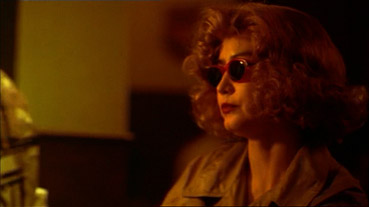
Like his unmet colleague, Cop 663's sorrow manifests itself in unusual fashion, his conviction that his flat is upset at his girlfriend's departure leading to pep talks to a bar of soap over its troubling weight loss, or a dishcloth regarding its worn condition and dripping tears of sadness. He's matched all the way by Faye's increasing fascination with the same space and objects, a passionate love-affair that she would never have the confidence to instigate with their owner. She's the only one of the lead quartet whose thought processes we are not given access to through voice-over, which in the case of the blonde-wigged woman provide the only window to a character whose shutters otherwise remain protectively fastened.
4. The Casting
So much of why this works at all, let alone as well as it does, is down to some divine lead role casting and performances. As the iconic blonde-wigged femme fatale, Brigitte Lin doesn't let the icy cool drop for a second and in a sense has the toughest job of anyone here, robbed as she is of much of her expressive potential by her impenetrable dark glasses. As Cop 223, superstar-to-be Takeshi Kaneshiro handles his quirkier character traits – gorging on all thirty cans on pineapple on the realisation that his girl has gone, or running when sad to leave no water for tears – with an engagingly wistful flair, while as Cop 663, Tony Leung's authority, easy charm and composed calm helped establish his credentials as one of Hong Kong cinema's future hot properties.
But as so many have observed, the film is almost stolen by pop singer turned actress Faye Wong, whose wide-eyed and beguiling nymph-like charm as Faye has sent many a male viewer into a dizzy spin, this one included. Her almost absent-minded dancing to California Dreamin' has provided the song with an impossible-to-erase visual accompaniment that no retrospective music video, however eye-catching, could hope to replace. Of course she also provides the film with it's only irreconcilable oddity, how Cop 663 could stand face-to-face with this woman and not show any interest beyond the delivery of his coffee. Man, he must have really loved that stewardess.
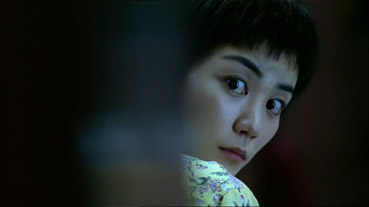
5. The Cinematography and Editing
Australian by birth, Christopher Doyle has over the past fifteen years established himself as one of Hong Kong's most distinctive and respected cinematographers, a rare if not unique feat for a non-native. Most interviews with Doyle, or documentaries in which he features, suggest a man who is permanently half-wired but whose unbridled energy perfectly and accurately reflects that of his chosen locale. It's his hyper-charged edginess and his sometimes dazzling camera skills (whatever else you may think of Hero, it never looks less than stunning), together with William Chang, Kai Kit-wai and Kwong Chi-Leung's energised and precision-cut editing, that give the film is powerhouse thrust and unstoppable momentum. Doyle's handheld camerawork in particular is electrifying, chasing breathlessly after Cop 223 as he runs through the crowded back streets, or providing an invisible dance partner for Faye as she mops the floor, prepares food for sale, or gently bops to her favourite CD track. Which leads us nicely to...
6. The Music
Can there really be anyone who sees Chungking Express who does not have its music lodged permanently in their cerebellum? This is not a composed score but functions as one just the same, the cherry-picked tracks providing the backbone of that aforementioned opening scene (Baroque by Michael Galasso), themes for both a specific locale (Things in My Life by Dennis Brown is always playing on the California Bar jukebox) and a character (you'll never hear California Dreamin' again without picturing Faye), or the driving force for a charged upbeat montage (Dreams by Faye Wong herself, a cover of the Cranberries song of the same name). The music is as integral to the fabric of the film as its cinematography and its locale and undergoes a number of almost invisible diegetic shifts, as a played CD expands in volume and clarity to become the score itself, a move that takes us to the closing credits in a manner that puts the widest of possible smiles on my face every time I see and hear it.
And so...
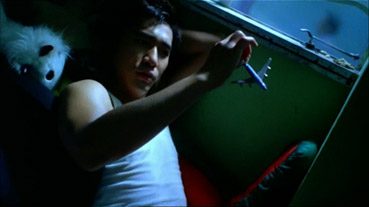
Oh, just see this movie. Wong Kar-wai has done great films since – I adore Fallen Angels [Duo luo tian shi] and I'd even suggest that his 2000 In the Mood for Love [Fa yeung nin wa] is a dyed-in-the-wool masterpiece, but Chunking Express has always been, and will likely always be, my personal favourite. I'm not alone here. In the December 2002 issue of Sight & Sound, a number of UK critics were polled regarding their top ten films of the past 25 years and Chungking Express came in at number 8, one of only three non-English language films on the list (something I actually found surprising). It remains the quintessential 90s Hong Kong movie, capturing the multi-racial and multi-lingual energy and creativity of the locale and its film industry, and in a style that is infused with a freshness and sensibility reminiscent of the French Nouvelle Vague at its most playful. It's not dated a jot in the years since I first saw it and remains a symbol of everything that's exciting about independent moviemaking, when filmmakers of vision work together to run and dance with the possibilities of cinema.
| sound and vision – Blu-ray and DVD |
|
Chungking Express has not had the best of rides on UK DVD, having first appeared as an iffy quality non-anamorphic disc from ICA Projects in 2001, then with a considerably improved anamorphic transfer from Artificial Eye three years later on a disc undermined by its sometimes tinny and over-crisp soundtrack. In the USA, meanwhile, the film was released by Quentin Tarantino's Rolling Thunder label, a disc whose cover gave the appearance that it was a Tarantino movie rather than a Wong Kar-wai one. The Korean remastered edition from Tae Won Entertainment was seen as an improvement over all previous DVD editions, while the news that Criterion had picked up the film for both DVD and Blu-ray release nearly prompted me to fork out for a region A Blu-ray player. A short while later Artificial Eye made a similar announcement for a UK release and I saved myself a couple of hundred quid.
The expectation would normally be that Artificial Eye's recent simultaneous DVD and Blu-ray release would be mastered from the same source and thus at least exhibit similar colour, contrast and brightness, but such is not the case. Now I should state that I'm working from a review disc here, and while you generally expect review discs to be representative of the final product this is not always the case – the reason we stopped reviewing DVDs from Peccadillo, for example, was that despite the high quality of many of their release discs, the review discs often had painfully poor transfers, an attempt to prevent pre-release piracy that unfortunately made it impossible to pass judgement on the quality of the transfer, one of the key things people read such reviews for. The colour and detail on this particular review disc are fine, and on brighter scenes the image is impressive, but the brightness is noticeably down on the previous Artificial Eye transfer in a manner that does provide more subtle highlights, but also results in a sometimes marked loss of shadow detail in darker scenes and indeed an increase in what constitutes shadow. The 102 minute DVD running time, which coincides with the length of the international cut of the film as seen in cinemas, is bereft of PAL speedup and thus suggests a standards conversion, which would explain a lot, although there are no obvious motion glitches to confirm this.
|
|
The new Artificial Eye disc compared with the old, the top grabs being
from the new release in both cases.
|
|
|
It may well be that someone will make the argument that this is truer to Wong's original vision than incorrectly graded previous prints, but I'm not buying this, particularly in the face of...
The Blu-ray disc, on the other hand, is absolutely spot-on. As with their Blu-ray disc of Ashes of Time, Artificial Eye have seemingly picked a film for high-def release that in some ways seems to fly in the face of the image advantages offered by the format. Shot on the streets and locations of Hong Kong in guerrilla fashion using high speed stock, the film grain is clearly visible at times, the use of step printing giving some sequences a blurred and indistinct image. But for the first time on a UK home video format the black levels are black, the contrast is correctly balanced, the shadow detail clear and the brighter colours vivid. And yes, while the blurrier images make it a close call between DVD and Blu-ray for detail in places, the HD transfer regularly outstrips the DVD transfer, being consistently brighter, noticeably sharper and displaying a richness of image that is genuinely film-like. Intermittently shots just leap out of the screen – the image of Cop 663 dreamily waiting for Faye in the California Bar bathed in neon and blue light looks absolutely gorgeous. The film is finally done justice here – true fans should definitely go for the high-def version.
The original mono soundtrack has also had a serious facelift in the shape of the very fine 5.1 track that appears on both the Blu-ray and DVD release. The clarity and range knock the one on the previous Artificial Eye release for six, something particularly evident in the dialogue, the music and the rumbling bass of the first scene thunder. The separation is excellent throughout – the rain near the end of 223's story is spread appropriately around the sound stage and with individual sounds specifically located (water can be heard dripping from the rood from the rear speakers only), while the bustle of the back street markets is vividly captured. The DVD also has a Dolby 2.0 stereo track, which is decent enough but nowhere near as inclusive, while the Blu-ray has an uncompressed DTS HD Master Audio track that I don't have the technology to eavesdrop on just yet, although the standard DTS track that gets sent to my amp in its place has enough oomph to suggest that this track will rule the soundtrack hill.
The optional English subtitles are always clear and appear to be decently translated, but miss a trick by not indicating when the spoken language switches between Cantonese, Japanese and Mandarin, an element of Cop 223's character and past relationships that might not otherwise get picked up by those unfamiliar with the sound or vocabulary of these dialects.
| extra features – Blu-ray and DVD |
|
Introduction by Quentin Tarantino (7:43)
I'm assuming that this has been poached from the US Rolling Thunder disc, although with the director referring to the 1995 Fallen Angels as Wong's latest film, the timing doesn't quite match with that disc's 2001 release. It does provide newcomers with a useful outline of the production, its style, its director and its actors, but kicks off in wince-inducing fashion ("I see you, film fans!"), and those who find Tarantino's grinny delivery annoying will find plenty to rankle them here.
On Location with Cinematographer Christopher Doyle (9:54)
Remember that bit above about how Doyle tends to come across in interview and documentary material? If you're looking for an example then this will certainly do, a featurette made for either TV or DVD on his home turf in which Doyle revisits some of the key locations in which the film was shot, including his own apartment. Conducted in a combination of English and Cantonese – in which Doyle is fluent – it's always interesting but does catch the cinematographer in typically excitable mood, something that sees him at one point getting forwardly chatty with two girls in California Bar location, from which he is then quietly escorted.
Interview with Wong Kar-wai (14:53)
Another extra that looks as if it's been imported from a Hong Kong disc, this interview covers a lot of the expected ground – how the film came about, the locations, the inspiration for the story, the cast, the music and the visual style – but houses an unannounced treat in the shape of a number of deleted scenes that are cut and scored as if playing as extracts from an alternative version of the film. There's some revealing stuff here too, adding to character detail and even changing changing how the first story ends.
Also included are Filmographies for Wong Kar-wai and Christopher Doyle and a rather naff Trailer (2:39).
Objectivity be damned, we're talking favourite films here, and if you've seen Chungking Express and don't share my enthusiasm then good luck to you but we have nothing to talk about. If you've never seen it then do so, as there's a chance you also fall in love with it, and if you're already a fan then the Blu-ray version is the disc you've been waiting for – the picture and sound are terrific and the extras well worth seeing. The DVD is OK, but the Blu-ray puts the film up on the pedestal it deserves, and it's this disc that come highly recommended.
* For those of you not familiar with this process it's usually used for poor man's slow motion, when the film has been shot at the normal frame rate of 24fps and the only way to slow it down is to print every frame two, three or four times, producing a stuttering slow-motion that compares poorly with the smooth slomo that results from shooting at a faster frame rate. Here the film plays at normal speed but only every fourth frame has been printed and then held for the following three frames, maintaining the 24fps running speed and effectively creating motion from a series of briefly held freeze frames.
** It's an image consciously borrowed from Gena Rowlands in the title role of husband John Cassavetes' Gloria, and one that was recycled in tribute by Samantha Morton in Carine Adler's 1997 Under the Skin. |